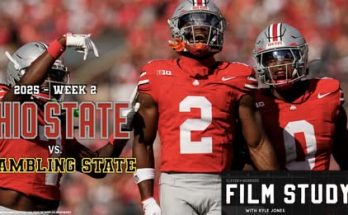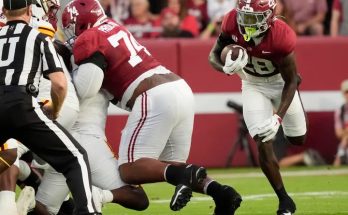Amid growing chatter surrounding Florida Gators head coach Billy Napier, the college football world has found itself divided after a shocking 18-16 loss to South Florida on September 6, 2025, at Ben Hill Griffin Stadium. The defeat, a stunning upset for a team ranked and expected to dominate, sparked outrage among fans who immediately took to social media to call for Napier’s dismissal, chanting “Fire Napier!” on platforms like X and flooding comment sections with heated opinions. However, not everyone in the football community has been quick to jump on the bandwagon of negativity. College football insider Greg McElroy, known for his balanced analysis and measured perspective, took to his Always College Football podcast to address the rash reactions, urging fans and pundits alike to pause before making premature judgments. McElroy’s stance was simple: Week 2 of the season is too early to declare a coach’s job in jeopardy based on one game, no matter how humiliating the loss may appear.
McElroy highlighted that while the performance was undoubtedly lackluster, with Florida committing 11 penalties for 103 yards and enduring several self-inflicted mistakes—including a spitting ejection and a botched snap that resulted in a safety—these issues do not necessarily reflect the entirety of Napier’s capabilities or coaching acumen. “We’ve seen coaches weather tougher storms,” McElroy argued. He pointed to Napier’s 2024 season as a reminder of his potential, noting that the Gators were able to secure key victories over formidable opponents such as LSU and Ole Miss, showcasing his ability to adapt and lead in high-pressure situations. For McElroy, context is essential, and a single early-season loss should not eclipse a coach’s previous successes or long-term vision for the program.
The reality is that Florida’s 1-1 record, compounded by an array of on-field errors, naturally fuels skepticism among fans, especially in a state where college football is more than a sport—it is a cultural institution. The penalties and mistakes were glaring and, in some ways, emblematic of larger systemic issues that need addressing. Yet, McElroy urged the fanbase to consider the bigger picture, emphasizing that football seasons are long, and a coach’s impact cannot be measured solely by early setbacks. “This is a marathon, not a sprint,” he reminded listeners, underscoring that patience is a virtue often overlooked in the heat of immediate disappointment.
Despite the vocal backlash online, there are analysts and commentators who remain cautiously optimistic about Napier’s ability to guide the Gators through what promises to be a challenging SEC slate. With matchups against ranked opponents such as No. 3 LSU on the horizon, Florida’s upcoming schedule is not for the faint of heart. McElroy and others stress that how a team responds to adversity can often be a more telling measure of coaching effectiveness than initial victories or defeats. The scrutiny is intense, and while 20-20 at Florida may seem a precarious record for Napier, it does not automatically equate to incompetence or failure. Instead, it may represent the learning curve and growing pains associated with managing a high-profile college football program in one of the nation’s toughest conferences.
The cultural pressure in Gainesville is immense, and the expectations for Napier were arguably unrealistic given the roster turnover, injuries, and other off-field variables that influence a program’s performance. Fans are entitled to express disappointment, especially after a home loss that many perceived as preventable. However, McElroy’s message was not to silence criticism but to temper it with reason. He noted that coaches are not immune to mistakes, and a single season or a single game does not define a career. The nuances of game management, player development, and strategic planning extend beyond what is visible on a stat sheet or scoreboard. By maintaining perspective, fans can engage in a more constructive conversation about the team’s future rather than succumbing to the emotional impulse of immediate outrage.
Furthermore, the South Florida game highlighted both areas of concern and potential for growth. The Gators showed flashes of competence, with moments of effective play-calling and individual effort that, under more consistent execution, could have led to a very different outcome. Analysts like McElroy argue that these glimpses of promise should not be overshadowed by the mistakes that dominated the narrative. It is a reminder that football is a game of inches and execution, and even the most seasoned coaches experience games where circumstances conspire against them. The vocal fan backlash, though understandable, risks overlooking the underlying capabilities and strategic vision that Napier brings to the table.
Social media has amplified the intensity of criticism in ways that previous generations did not experience. In the aftermath of the loss, platforms like X became echo chambers of frustration, with hot takes quickly snowballing into calls for immediate action. McElroy directly addressed this phenomenon, cautioning that the instantaneous nature of social media reactions can distort perceptions of reality. While fans’ voices are important, they must also be contextualized within the broader scope of team development and long-term coaching strategy. Knee-jerk reactions to early losses are not uncommon in college football, yet they often fail to account for the season-long challenges and opportunities that a coach must navigate.
Billy Napier himself has remained publicly composed despite the growing scrutiny, demonstrating professionalism amid mounting pressure. His focus on correcting mistakes, motivating the team, and preparing for future matchups reflects a commitment to his role that some critics may overlook in their rush to judgment. The SEC is unforgiving, and the Gators’ path forward will test not only the players but also the resilience and adaptability of their coaching staff. Analysts suggest that Napier’s response to adversity, particularly in the wake of this unexpected loss, may ultimately define his tenure more than the loss itself.
The debate surrounding Napier also raises larger questions about patience and expectations in college football. Coaching is often viewed through the lens of immediate results, but sustained success requires vision, recruitment acumen, and the ability to develop players over multiple seasons. McElroy’s commentary emphasizes that a holistic evaluation of a coach involves considering past performance, trajectory, and the capacity to overcome challenges. By this measure, Napier’s track record, including notable victories and a demonstrated ability to elevate the program in 2024, provides a counterbalance to the frustration generated by a single early-season defeat.
As Florida prepares to move forward, the focus will inevitably shift to how the team rebounds from this setback. Analysts and fans alike will scrutinize practices, adjustments in game plans, and player performance in the weeks to come. Success against formidable SEC opponents will be critical not only for bowl eligibility but also for validating Napier’s approach and maintaining confidence in the program’s direction. McElroy’s insistence on measured criticism serves as a reminder that the narrative is not fixed and that coaches, players, and teams have the capacity to redefine their seasons after early adversity.
In summary, the intense criticism surrounding Billy Napier following Florida’s loss to South Florida highlights the passionate and often unforgiving nature of college football fandom. Yet voices like Greg McElroy’s provide an important counterpoint, emphasizing patience, context, and long-term evaluation over immediate reaction. While the 1-1 record, coupled with visible mistakes, certainly warrants analysis and reflection, it does not necessitate the conclusion that Napier’s tenure is in jeopardy. With a challenging SEC schedule ahead and a team capable of growth, the Gators’ season remains a story still being written. In the end, how Florida responds—both on the field and as a fan community—may determine whether this early setback is remembered as a moment of crisis or as a temporary hurdle in a larger narrative of program development. The conversation surrounding Napier serves as a microcosm of college football’s broader dynamics: a blend of passion, expectation, scrutiny, and the enduring potential for redemption.



